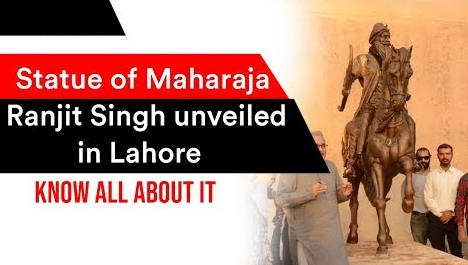Table of Contents
Context
- Statue of Ranjit Singh, who ruled Punjab for almost four decades (1801- 39), was inaugurated in Lahore.
- June 27 is his death anniversary. His legacy endures for Punjabis around the world.

Life and times
- Ranjit Singh was born on November 13, 1780 in Gujranwala, now in Pakistan.
- Ranjit Singh overthrew the warring Misls
- He was given the title Lion of Punjab (Sher-e-Punjab)
- His general Hari Singh Nalwa built the Fort of Jamrud at the mouth of the Khyber Pass
- At the time of his death, he was the only sovereign leader left in India.
Modernized Army
- Ranjit Singh’s combined the strong points of the traditional Khalsa army with western
- Appointed French General Jean Franquis Allard to modernise his army.
- He also employed a large number of European officers
- During the Battle of Chillianwala,
- the second of the Anglo-Sikh wars that followed Ranjit Singh’s death, the British suffered the maximum casualties of officers in their entire history in India.
- Ranjit Singh’s trans-regional empire spread over several states.
- The boundaries of his state went up to Ladakh — Zorawar Singh, a general from Jammu, had conquered Ladakh in Ranjit Singh’s name — in the northeast.
- His empire extended till Khyber pass in the northwest, and up to Panjnad in the south.
Legacy
- The maharaja was known for his just and secular rule
- The Sikhs take pride in him for he turned Harimandir Sahib at Amritsar into the Golden Temple
- Right at the doorstep of the sanctum sanctorum of the temple is a plaque that details how in 1830 AD
- Funded Hazoor Sahib gurudwara at the final resting place of Guru Gobind Singh in Nanded, Maharashtra.
Recognition
- In 2016, the town of St Tropez in France unveiled the maharaja’s bronze statue .
- His throne is displayed prominently at the Victoria and Albert Museum in London.
- Exhibitions on his rule are frequent in western countries home to the Punjabi diaspora.
- Last year, London hosted an exhibition that focused on the history of the Sikh Empire






















 WhatsApp
WhatsApp